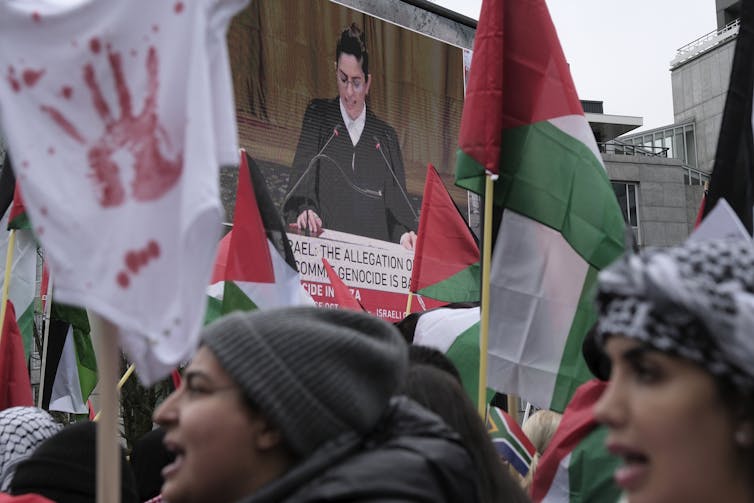Pakistani Women Are Demanding Answers for Enforced Disappearances and Killings
Hundreds of Baloch women are demanding the return of their missing loved ones amid staunch government repression.
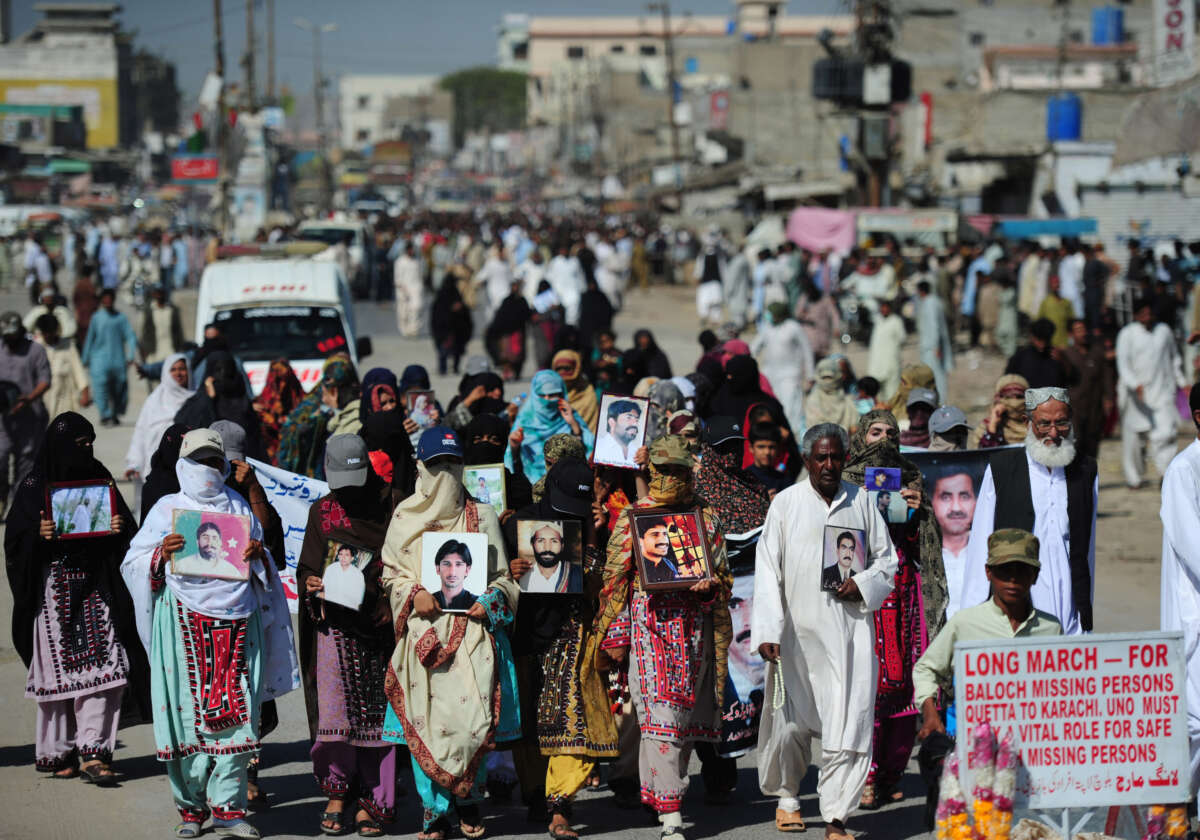
This article was originally published on .
As hundreds took to the streets of Pakistan’s largest city, Karachi, on Jan. 12, a sea of mostly female protesters continued screaming “Balochistan wants justice,” even as they were met with a .
Meanwhile, back in the restive but beautiful southwestern province of Balochistan, thousands more swarmed the streets. Their protest against and in their province was just the latest mobilization for a movement that has grown exponentially over the past month.
Following the November killing of 22-year-old Balaach Mola Baksh, hundreds of women — along with some of their children — began a roughly thousand-mile march from his hometown of Turbat to Islamabad on Dec. 6. After arriving in Pakistan’s capital city, they set up camp in front of the National Press Club.
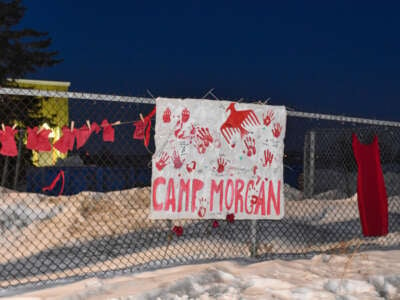
INTERVIEW |
Canada Has “Been Failing My Family for Over 100 Years,” Says Indigenous Activist
Families of missing and murdered Indigenous women have no recourse, says Cambria Harris whose mother was murdered. By Jen Deerinwater , TRUTHOUT April 17, 2023
For nearly a month, these protesters — comprised of some nearly 300 families whose loved ones are victims of enforced disappearances and killings — have been living in tents made of cloth and tarpaulin, even as temperatures approach freezing. With more protests cropping up around the country and human around the world starting to take notice, this women-led movement is showing its power in the face of staunch government repression.
‘They killed him’
“When I went to see his body the agency people told me to bury him, but I said ‘No, I want justice,’” explained Najma Baloch by phone from the sit-in protest in Islamabad. “This is not just my brother, this is the brother of all Baloch people.”
Balaach was taken by men in civilian clothes from his home in Turbat at 1 a.m. on Oct. 30. The family believes these men — who arrived in a convoy of eight cars — were from Pakistan’s Counter Terrorism Department, or CTD.
“When he returned home from work that evening we never could have imagined we would lose him a few hours later,” Najma said about her brother, who worked as an embroiderer in a handicraft shop.
“My mother said the tyrants took him,” Najma continued. But when they approached the police, they were told Balaach was not in their custody. “I said ‘Then where is he? Did the earth eat him up, or did the sky swallow him?’”
It wasn’t until nearly a month later, on Nov. 21, that Balaach appeared in court, where he was remanded to CTD custody for 10 days.
“When we saw him in court my mother and I hugged him,” Najma said. “We were so so happy for my mother it was like he was born again. Two days later they killed him.”
On Nov. 24, CTD issued a statement saying that Balaach had admitted to being involved in a “terrorist operation,” providing them with information that led CTD to his associates’ hideout. When they arrived, according to the statement, an “exchange of fire” took place and four dead bodies were recovered, one of which was Balaach.
“They said he died in an ambush, but we saw him in court — so how could he die in an encounter? It was a fake encounter … they killed him,” Najma said. “I am devastated beyond measure.”
Najma described Balaach as loving brother and son. “He always took care of our mother. He was still so young, and he was not involved in whatever they are saying. He was never involved with anyone bad, he was completely innocent.”
While the CTD denies allegations of kidnapping and murder, it also insists Balaach was only arrested on Nov. 20 — the day before he was presented in court — not on Oct. 29, when he was taken from his home. For activists, this is only further evidence that Balaach became one of thousands in Balochistan to suffer an enforced disappearance and extrajudicial killing.
A movement is born
When Najma’s family received Balaach’s dead body they refused to bury him for seven days, sitting in protest outside their home with his body. People all across Turbat joined the protest, and thus began the wave of protest Pakistan is now witnessing.
Hundreds of women like Najma are turning out to demand the return of their loved ones who have been forcibly disappeared for years — some for over a decade — and taken from their homes in the same way as Balaach. These women have continued to protest despite stringent opposition by police forces.
At the Jan. 12 gathering in Karachi, the police issued an incident report that accused protesters of rioting, causing public nuisance, unlawful assembly and inciting disharmony. If the protesters are charged with these offenses, they face a prison term of up to two years, or fines, or both.
Despite the intimidation, protesters remained until after dark, turning on their phone flashlights while chanting “We stand with Mahrang Baloch” — referring to one of the leaders of the movement against enforced disappearances. She was just 10 years old when her father was first taken by security forces in 2006. He was released three years later, only to be abducted again in seven months. Two years later his mutilated body was found.
While her face has become synonymous with the movement, Mahrang’s story is not unique. The says it has registered 8,000 cases of enforced disappearances since 2013 in accordance with the U.N.-advised method for recording such incidents.
“Enforced disappearances are used as a terror tool to intimidate common people,” Mahrang said, “to squash their political movements, to exploit the resources in Balochistan and to take Balochistan under Pakistani control in the manner of colonial rule.”
How Balochistan got here
Balochistan was annexed by Pakistan in 1948, giving the country one of its largest reserves of natural gas. In recent years, its Gwadar Port, situated on the Arabian Sea, has become a — allowing Pakistan to expand its trade corridors and China to bypass the U.S.-patrolled Malacca Strait and access the Middle East.
Despite Balochistan’s importance to Pakistan, many there say the territory should never have been annexed. Some separatist groups — the Baloch Liberation Army, or BLA, and Baloch Liberation Front, of BLF — continue to fight for this cause.
According to veteran Baloch journalist and political analyst Malik Siraj Akbar, the government in Pakistan has always been afraid that Balochistan would become another Bangladesh, which was formerly East Pakistan and became its own country in 1971, following a bloody war of liberation. Akbar believes that it is this fear — the need to suppress any dissent and maintain control of Balochistan’s natural resources — that explains the state’s repressive policies.
“The military in Pakistan is the de facto powerhouse,” he said. “It controls everything,” especially since 9/11, when Pakistan received a lot of anti-terror funding, which allowed for the modernization of the military and keeping Balochistan “in check.”
In 2006 Pakistan’s security forces killed Akbar Bugti — a former chief minister and popular separatist leader of Balochistan. This is an event that Akbar describes as Balochistan’s 9/11. “It changed everything,” Akbar said. “When Bugti died people in Balochistan began wondering what would happen to them if someone like Bugti, a former chief minister, could be killed.” Following his death, separatist groups in Balochistan retaliated by attacking Pakistan’s infrastructure, and the Pakistani military responded by carrying out more enforced disappearances.
“This began the policy known as the ‘’” Akbar explained, referring to the kind of disappearances and killings that Balaach and hundreds of others have suffered. Pakistan’s official position, however, is that this is simply a part of its crackdown on anti-state actors. Even current caretaker Prime Minister Anwaar-ul-Haq Kakar — who is from Balochistan — has spoken out against the recent protests, calling the women and their families “fake heroes of human rights” and telling them to “go and join the BLF or BLA so the state knows where you stand.”
In just the last week, Balochistan has found itself in the crosshairs of between Iran and Pakistan. Amid the exchange, Iran launched what it called “preventative action” against the Sunni Muslim militant group , while Pakistan struck alleged hideouts used by the BLF and BLA. All three targeted groups are ethnically Baloch, but — according to protesters — it was civilians, not terrorists, who were killed in the attacks.
As protest leader Sammi Deen Baloch noted, “The Baloch people are always the ones caught in the middle, it is their lives which are lost.”
A fight for generations
Like Mahrang, Sammi Deen — the general secretary of Voice for Missing Baloch Persons — also got involved in the movement as a result of her father being abducted. She has been marching to bring him home since 2009, when she was 10 years old.
“This is the same movement that has been going on for decades,” Sammi Deen explained. “It hasn’t just erupted suddenly.”
In 2010, she visited the capital city of Islamabad for the first time, participating in a march accompanied by seven other families whose loved ones were forcibly disappeared. They returned in 2011 with a few more families. Then, in 2013, they did a “long march” from the city of Quetta in Balochistan to Islamabad, traveling on foot for three months and 18 days.
As a result of consistent protests over the years, 300 families — according to Sammi Deen — now feel empowered to speak up for their loved ones. “In 2013 not many people were aware of the forcibly disappeared persons in Balochistan,” she explained. “But today we have a big tool in social media, which we can use to disseminate our voices to people all over the country and around the world.”
Both Mahrang and Sammi Deen agree that social media has been a big part of their activism. From the organized use of hashtags like #MarchAgainstBalochGenocide and #IStandWithBalochMarch to from the protest site, sharing their voices online has become a crucial way for the protesters to amass support across Pakistan.
“Traditional media channels don’t cover this,” Mahrang said, “so there is no way for people to know … but now common people in Pakistan are being forced to look at the role they play in the genocide of the Baloch people.”
For Mahrang and all the families protesting, this very much is a genocide — a targeted destruction of the Baloch people and their identity that has been taking place over decades. However, at a Jan. 1 press conference, Interim Prime Minister Kakar described “his fight” as not against any particular race or caste but against the various anti-state organizations in Balochistan.
Women take charge
Apart from social media, another unique characteristic of this movement against enforced disappearances is that it is being led by women like Mahrang and Sammi Deen.
“This movement is a culmination of two decades of women’s suffering, and they are the ones now leading it,” Mahrang said. “There are mothers, sisters, grandmothers, half-widows … and this shows people that we aren’t agents of any organization but simply common people of Balochistan bringing forward our pain and oppression.”
Another reason women have taken the lead, according to Sammi Deen, is to protect their male supporters and family members. “In Balochistan men are not safe in any way, whether it is activism or if they are just going to the market,” she said. “We never know if they will return home alive and safe.”
That being said, the women themselves have been far from safe when it comes to police crackdowns. On the evening of Dec. 20, when the march reached the outskirts of Islamabad, they found their entry blocked by police forces.
A petition filed on Jan. 3 by Sammi Deen to the high court in Islamabad described the interaction, saying “Police baton-charged the protesters and used water cannons against these marchers and their supporters.” Meanwhile, in his press conference, Kakar described the use of water canons as “standard practice of law enforcement across the world.”
Mahrang and 52 other women and children protesters were detained for over 24 hours and only released after the high court ordered it. Another 290 students, women and children were later detained for five days before being released. According to the petition, “the Baloch women and children were brutalized by the Islamabad police,” and an attempt was made to force them onto buses and send them back to Quetta in Balochistan. The Islamabad police rejected these claims on the social media platform X, saying there was “no ill-treatment of women or children.”
Once the protesters were at the sit-in at the National Press Club in Islamabad on Dec. 23, families of missing persons were threatened with arrests if they did not vacate the protest site, and the police repeatedly blocked the entry of food and blankets, which are essential in the Pakistani winter. They were also targeted by masked men in plain clothes, who stole their speaker while pointing loaded guns — all in the presence of the police and multiple surveillance cameras.
With surveillance cameras present nearly everywhere around the sit-in, the police — according to Mahrang — are clearly trying to intimidate the mostly female group of protesters. For their parts, Mahrang has been accused of sedition and Sammi Deen has been the target of a “vile and dirty propaganda campaign” using false photos depicting her with militant groups with whom she has no connection. This incident forced Sammi Deen to take off her niqab (the face covering worn by some Muslim women) which she had previously always worn in press conferences. Nevertheless, Sammi Deen, vows to not be silenced.
Changing tides and demands that pave a way forward
This March Against Baloch Genocide — as the protesters often refer to their movement — has received an unprecedented show of support in the form of solidarity protests in various parts of Balochistan, as well as other Pakistani provinces, and even in front of in London, where protesters held a .
According to Mahrang, this response is due to the protest making people feel heard for the first time in decades. “There has always been a negativity spread around that common people do not hold any power in front of the Pakistani establishment and we just have to follow them blindly,” she said.
According to Akbar, the political analyst, this is also because, for the first time, people’s faith in the military has faltered. “There’s a segment of the population that has begun to realize that the military is not so clean,” he said. “In the past people may not have believed all these allegations against the military. But now that they see that former Prime Minister has been so badly silenced that he can’t even contest in the next elections — despite being the country’s most popular leader — people are starting to question things.” Akbar also pointed to the role that social media has played in giving people outside Balochistan a window into their suffering.
According to Sammi Deen, one of the movement’s main objectives has been to collect data. In less than a month, while marching from Balochistan to Islamabad, they have gathered evidence of roughly 600 missing persons. “God forbid, if someone dies tomorrow in a fake encounter, we will at least know if he was [already] missing from before.”
In addition to collecting data, the movement is also working to bring the killers of men like Balaach to justice. On Dec. 9, after initial resistance, the police registered a complaint against four CTD personnel on the direction of a lower court. Then, two days later, the high court ordered the immediate suspension of the four CTD personnel. A committee was also formed to investigate the death. However, no arrests have yet been made.
“We want all the missing persons of Balochistan to be released and … we want to see progress in their cases,” said Sammi Deen before adding that the CTD and state-sponsored “death squads” (or private militia) responsible for these enforced disappearances and extrajudicial killings should be disbanded.
On Jan.10, Mahrang and Sammi Deen were able to speak with U.N. Special Rapporteur on Human Rights Defenders Mary Lawler about the need for a U.N. fact-finding mission in Pakistan to investigate the human rights violations and genocide in Balochistan. , Lawler said, “The reports of police harassment are v. concerning. Spurious criminal complaints against peaceful protesters should be dropped.”
According to Akbar, as long as there is “genuine will from the military,” it is feasible for the disappeared persons to be returned home, so long as they haven’t already been killed. “The military is a very organized institution, so they definitely have accounts of these missing persons.” Akbar also noted that a large number of missing persons were released in the past when the government wanted to appease the Baloch people. However, Akbar does not believe Pakistan will allow an independent U.N.-fact-finding mission into Balochistan, as Pakistan considers it a sovereign matter.
“This is a collective punishment because when one family member is disappeared all his loved ones suffer,” Sammi Deen said. “It is the uncertainty, the continuous wait, the torturous pain that is unbearable.”
Despite all that, or perhaps because of it, Sammi Deen and Mahrang believe that this movement will not burn out, but continue and grow its important work.
“We are expanding this movement all over the country and all over the world,” Mahrang said. “Anyone who sympathizes with us, we appeal to them to protest in solidarity, to send petitions to the U.N., to write to your parliaments to initiate discussions. This is just the beginning, and we will take this forward peacefully.”
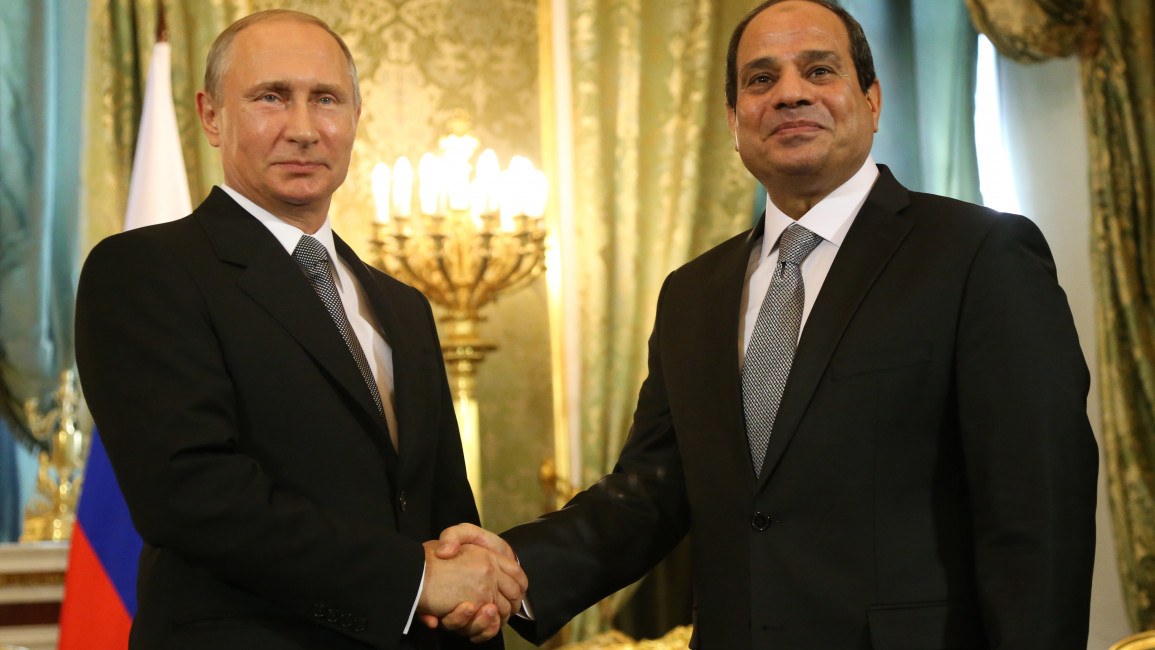

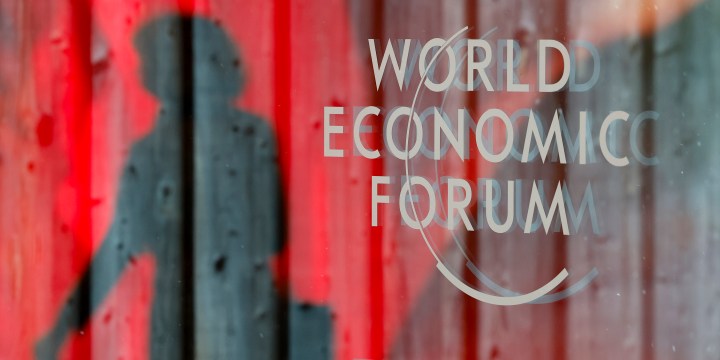

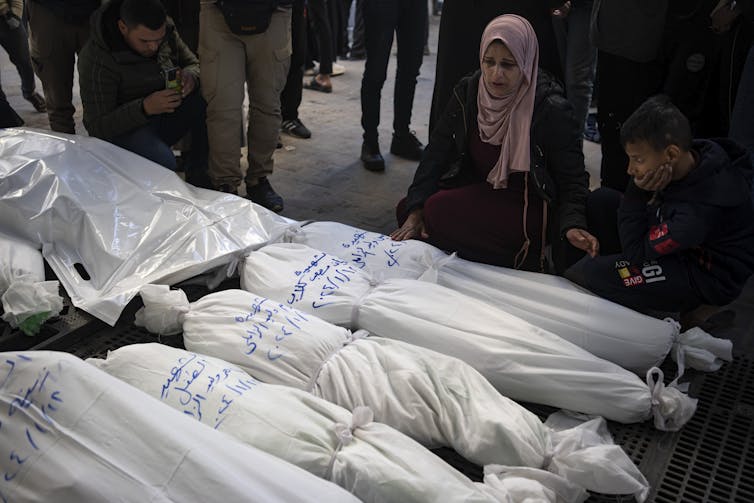 Palestinians mourn their loved ones killed in the Israeli bombardment of the Gaza Strip outside a morgue in Rafah, southern Gaza, on Jan. 18, 2024. (AP Photo/Fatima Shbair)
Palestinians mourn their loved ones killed in the Israeli bombardment of the Gaza Strip outside a morgue in Rafah, southern Gaza, on Jan. 18, 2024. (AP Photo/Fatima Shbair)